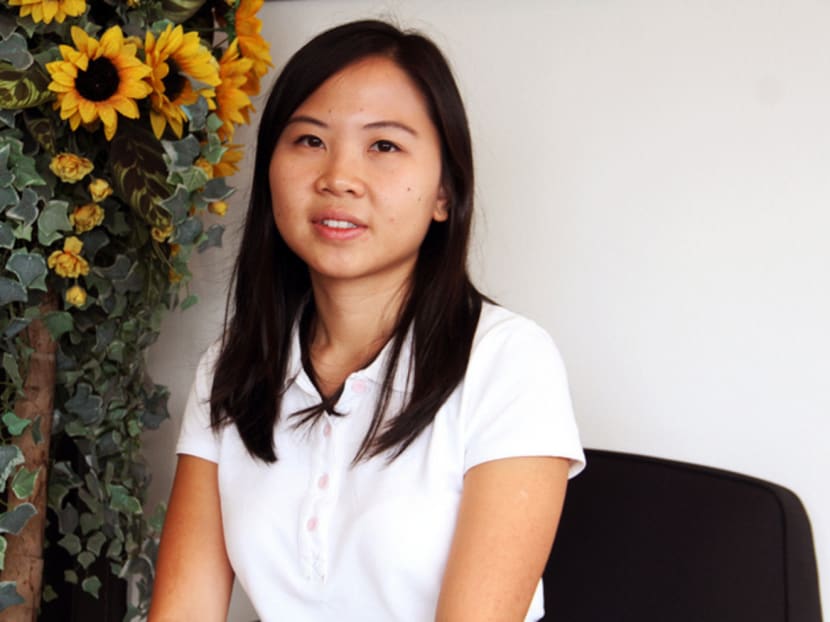In face of changing times, engineers stay relevant by diversifying their skill sets
SINGAPORE — Not content with being a keyboard engineer working on environment-related projects mainly from her desk, Ms Poh Li Ping decided last year to make a switch to her preferred field of civil engineering before age was not on her side.

Ms Poh Li Ping, an environmental engineering graduate, says attending extra courses has opened up more opportunities for her. Photo: Damien Teo
SINGAPORE — Not content with being a keyboard engineer working on environment-related projects mainly from her desk, Ms Poh Li Ping decided last year to make a switch to her preferred field of civil engineering before age was not on her side.
And that has become possible with the help of a bridging course under the Institution of Engineers, Singapore (IES), and a National University of Singapore master’s programme in civil engineering she will complete in six months’ time. The 27-year-old environmental engineering graduate is now able to supervise building works on constructions sites and be involved in the structural design of buildings.
“By attending all these extra courses, this has opened up one more door for me for future opportunities,” said Ms Poh.
Getting engineers to diversify their skill sets through continual education is one of the aims of the IES to ensure that engineers stay relevant amid changing economic needs.
The latest Manpower Statistics on redundancies shows that under the professional services category, the architectural and engineering services had the sharpest spike in redundancies, from 350 in 2014 to 940 workers last year (2.7 per cent to 6 per cent).
The Ministry of Manpower noted in its report that the slowdown in demand in marine and construction has also led to higher redundancies, including the engineering services.
Mr Mah Cheong Fatt, executive secretary of the Shipbuilding and Marine Engineering Employees’ Union, told TODAY that its members in the engineering line have been affected by wage cuts or retrenchments.
And the challenges faced in returning to the workforce include getting a lower salary or being employed only on contract, he said.
The IES does not track the number of engineers switching fields but has introduced bridging courses for them and is working with unions to help engineers acquire skills to move into management roles.
IES immediate past president Chong Kee Sen said that while there will always be a demand for engineers as Singapore develops its infrastructure and looks into value-added innovation, engineers must also upgrade continually to ensure their relevance.
Citing green technology and ageing-friendly infrastructure, he added: “Increasingly, engineers need to pursue training beyond their immediate discipline, as engineering projects are becoming more complex, often requiring engineers to work across multiple disciplines”.
Labour economists like Nanyang Technological University professor Chew Soon Beng said that the “nature of work has changed and will change faster”. The future workforce must be able to handle big data, for example.
He suggested that engineers can couple their training with financial and econometric skills to stay employable, but added that more must still be done in career progression to keep them in the engineering workforce.
SIM University’s Dr Walter Theseira noted that time and substantial training are required to have highly specialised engineers or those who are able to switch between disciplines.
He added, however: “The fact that good engineers are numerically-skilled problem-solvers means they’re in high demand in non-engineering jobs. So there’s attrition ... when engineering doesn’t pay as well.”
He suggested better pay and working conditions in engineering, as well as continual training, to build a Singaporean core in this field.
Switching between engineering disciplines, however, is not always about obtaining certificates. Medical technology engineer Neo Kok Beng believes having an “open mind” is the most important criterion. The NUS adjunct associate professor ventured into medical technologies after working in electronic engineering for over a decade, grabbing opportunities to work on medical products that came his way.
To brush up on his understanding of medical technologies, Mr Neo, 51, spent time poring over the regulatory requirements needed for this field and attended conferences. It took him about three years to get a good grasp of the regulations, but he says the learning never stops when technology is hastening the pace of change.
“Engineers are equipped with very good training in the fundamentals of logic, systemic thinking ... skills that can be used across many industries,” added Mr Neo. “I believe that as the boundaries between industries blur and as sectors become more interdisciplinary, engineers will be able to switch across disciplines as well.”









